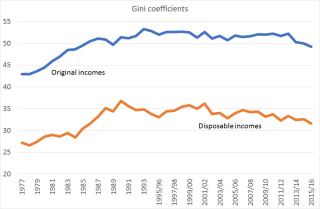No comfort from falling inequality
The ONS reports that inequality, measured by Gini coefficients for both pre-tax and post-tax incomes, has fallen slightly in the last ten years. I fear this is an example of how statistics sometime don���t tell us very much.
- Even if inequality is now falling, the damage done by the previous rise in it still lingers. To paraphrase Joseph Schumpeter, if a man has been hit by a lorry you don���t restore him to health by reversing the lorry. And this damage is considerable. It consists not just of slower economic growth but of increased distrust and coarsened politics: the oft-heard allegations that "elites" are out of touch with the ���people��� are the product of that earlier rise in inequality. 
- ONS data tell us nothing about the incomes of the super-rich. But we know that the salaries of CEOs of big companies have risen far faster than average incomes, as have incomes of richer bankers. Rising incomes of the super-rich are consistent with a flat or falling Gini if inequalities between the moderately well-off and moderately poor narrow ��� as has happened.
- The same Gini coefficient can describe very different economies. A bourgeois society in which many are doing OK whilst only a few are very poor or very rich can have the same Gini as a winner-take-all society in which some have massive incomes whilst there���s income support for the poor but a hollowed-out middle class. But these will be different societies with (ultimately) different cultures. I suspect that the stable-ish Gini hides the fact that we���ve shifted from the former to the latter.
- Gini coefficients tell us nothing about how inequality arises. The same Gini might arise from people happily paying a man for his great talents (as in Nozick���s Wilt Chamberlain example) or from that man ripping people off. What troubles some of us is that our current inequality is due a lot to the latter.
- It���s not just inequality of income that matters. Inequalities of status and power also do ��� not least because they contribute to bad decision-making and degrading working conditions. These are very much still with us.
My point here is a trivial one. We should ask of all statistics: what exactly is it that these are telling us, and what aren���t they? I fear that inequality statistics might not be telling us much. Of course, my concerns about the causes and effects of inequality might be mistaken. There���s a debate to be had here, but it won���t be settled by the ONS���s data.
Chris Dillow's Blog
- Chris Dillow's profile
- 2 followers



